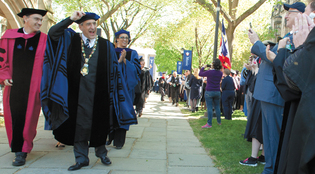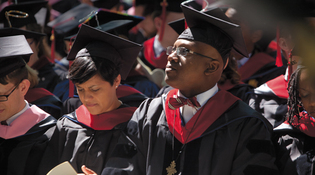 loading
loading
featuresOn gratitudeThe Baccalaureate Address Peter Salovey ’86PhD is president of Yale University. This speech, his first baccalaureate address, was delivered three times, to three different groups of graduating seniors and their families, May 17 and May 18 in Woolsey Hall.  Mark OstowPresident Peter Salovey ’86PhD, with Provost Ben Polak to his right, tips his beret to bystanders during the processional. View full imageColleagues, friends, families, graduating seniors: it is a pleasure to greet you today and offer a few words on this celebratory weekend. Over the years, I have participated in the baccalaureate service in various roles—as a member of the faculty, as a dean, as provost, and now, for the first time, as president. There is a Yale tradition that I have observed that I would like to continue today, during a year in which we have introduced new rituals while also honoring old ones: might I ask all of the families and friends here today to rise and recognize the outstanding—and graduating—members of the Class of 2014? And now, might I ask the Class of 2014 to consider all those who have supported your arrival at this milestone, and to please rise and recognize them? Thank you! I delight in this custom not merely because it is lovely in its own right, but also because my baccalaureate remarks today focus on gratitude. I talk about gratitude in part because I am so thankful for the dedicated leadership of Yale College that Dean [Mary] Miller [’81PhD] has provided since December 2008, and in part because gratitude turns out to be one of the keys to happiness. For most of my adult life, I have been a student of human emotion. It is the basis for my academic career and one of the passions of my professional life. And although there is a large—and growing—body of scholarly literature on emotion, it might surprise you that the psychological literature on gratitude is rather meager. Laboratory experiments exploring gratitude are few and far between. Field studies of how children learn to say “thank you” are viewed as quaint and old-fashioned. We all know—all of us in our own minds—what it means to be grateful, particularly on a weekend like this one. But until the last decade, gratitude almost never appeared in handbooks and encyclopedias of human emotions compiled by psychologists. And the neglect of serious consideration of gratitude is not limited to psychology: Aristotle, for example, did not include it on his famous list of human virtues. But even if psychology and Aristotle have neglected gratitude, many philosophers—from Cicero to Seneca to Aquinas to Spinoza to Hobbs to Hume and Kant—acknowledge that the ability to express gratitude is not just socially polite but also a core human capacity. These philosophers worry that societies characterized by ungrateful people—by ingrates—might be unjust and unfair, and turn to vengeance and destruction. The fact that there has been so little attention paid to gratitude in my field of psychology—the fact that you and I might not pay enough attention to it—could be because the need to express gratitude reminds us that we are not entirely in control; that we might be indebted or dependent; that our destiny is not entirely in our hands; indeed, that on occasion we are vulnerable. As one of my favorite contemporary philosophers of emotion, the late Robert Solomon, liked to say, gratitude is an uncomfortable emotion because it forces us to “recognize that none of us is wholly self-sufficient and without the need of help from others.”1 Gratitude forces us to reflect on the limits to our sense of agency. Although one’s heart might be filled with gratitude, expressing it may sometimes feel a bit uncomfortable. Even gratitude toward a higher power can make us squirm if it seems over the top, as when one of my favorite country music singers thanks the Lord for providing him with a Grammy award, or even when Big Papi dramatically points toward the heavens after blasting a homer over the right-field wall in Fenway Park. (I offer my apologies to any Yankees fans out there for summoning up that image.) And yet, true happiness in life, and true health in society, may not be possible without the capacity to reject the myth of total self-reliance. The good life may be out of reach unless we are able to cultivate an openness to accepting help from others and expressing gratitude for that help. In the course of preparing this address, I was thrilled to discover that none other than Adam Smith, an economist known best for his focus on the importance of self-interest as a motivating force, was one of the first social scientists to point out the importance of gratitude!2 Smith clearly and cogently observed that passions and emotions are what knit a society together. Sentiments like gratitude, Smith argued, make the social world better—more benevolent and more secure. A social psychologist could not have said it better!  Mark OstowDivinity School graduates—and a School of Music graduate, far left—during the ceremony. View full imageThere is no doubt that when we experience gratitude, it is difficult to feel negative emotions like envy, anger, or hatred at the same time. In fact, people who report that they express a lot of gratitude—people who respond positively to survey items like “I sometimes feel grateful for the smallest things,” and “I am grateful to a wide variety of people”—also tend to score high on psychological measures of what is called subjective well-being, that is, satisfaction with their lives.3 Why might this be? Well, one human tendency that is incompatible with expressing gratitude is social comparison, especially the insidious tendency to compare ourselves with those who have more than we do. It appears that people who feel gratitude are less likely to envy others, and thus they avoid an emotion that can be quite corrosive. Moreover, grateful people seem far more able to cope with the stresses and strains of life; they are more resilient because they find the good even in difficult circumstances, and other people like them better. What’s more: people are more willing to come to the assistance of others who have expressed gratitude toward them in the past.4 To quote that great twenty-first-century philosopher Justin Timberlake: “What goes around… comes all the way back around.”5 Psychologist Barbara Fredrickson argues that feelings of gratitude broaden one’s mind—that is, they allow you to consider a wider and more creative array of possibilities, options, and alternative courses of action.6 This broadening of the mind produces a sense of personal resourcefulness and self-efficacy. Fredrickson contends that these feelings foster a desire to empathize with and help other people, and to consider a wider array of potential ways to be helpful that go far beyond simple reciprocity, or tit for tat. The origins of this sort of behavior even can be observed in non-human primates like chimpanzees—when one chimp shares food with another chimp, and the chimp who received the food throws his arms around the food-sharing chimp in a warm hug. Or, when one chimp grooms another chimp and then a day or two later, the recipient of the grooming shares food with the groomer.7 You probably think I got all this from watching The Lion King, but as these examples suggest, gratitude might be a key to social harmony. Indeed, gratitude may strengthen one’s sense of belonging to a community, of obligations to being a good citizen, and of loyalty to the greater good. Perhaps this social reinforcement is why gratitude seems to be observed in various forms across all cultures. Communities in which gratitude is expressed publicly become knitted together through a shared sense of appreciation for everyone’s contributions. Public ceremonies and other displays of gratitude encourage a kind of optimism and a shared sense of purpose. So, let’s get back to talking about you, soon-to-be graduates of Yale College: you are likely feeling gratitude today. The trouble is, you owe so much to others that you can never fully repay them for the great things you receive in life. And on a day when you are receiving so much, so much warmth, so many congratulations, it is always good to remember that no great gift you have been given—the opportunity for an education, which you earned but also received—no truly great gift can ever be “repaid.” Instead, it must be paid forward, and it is up to you to pass this gift on to others in the next generation in the same way you received it. Former US poet laureate Billy Collins captures these feelings in a poem written for his mother, called “The Lanyard.”8 And, because Mother’s Day was only a week ago, it seems appropriate to read it to you on this occasion:
And so seniors, my message today is not “you need to thank your mothers”—although that would not be such a bad idea—but rather that you should spend at least a few moments—in spite of all the hoopla this weekend—thinking about all of those individuals who helped you get to this moment in your lives, all those individuals whom you can never repay. They might be family members and friends, beloved teachers and mentors, or even authors whom you have never met. But think about them, and, when the moment is right, say a quiet “thank you.” As William Lyon Phelps [Class of 1887, ’91PhD], a distinguished professor of English at Yale in the early part of the twentieth century, once wrote, “gratitude begets happiness.… The more one gives, the more one has left.”9 Women and men of the Class of 2014: congratulations! We are delighted to salute your accomplishments. We are overjoyed to celebrate with you. We are proud of your achievements. Remember to give thanks for all that has brought you to this day. And go forth from this place with grateful hearts, paying back the gift you have received here by paying it forward for others.
|
|